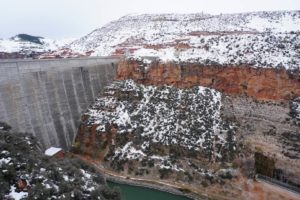 Beneath the cold, clear waters of the Bighorn River, a smooth brown trout flicks their tail, leaning headfirst into the current, hiding within the flowing green water grasses. Tiny flying insects are plentiful; they flutter above the surface, newborns freshly hatched and tasting the dry air for their first and last time in just one day. The trout rises and eats one. On the surface, Conner, the angler of the group, flicks his fishing rod and feels the trout latch on. Then they tug each other until finally, the brown is drawn out of the water into the unfamiliar world of the Above. He kills the trout, puts them in his boat, and we paddle on.
Beneath the cold, clear waters of the Bighorn River, a smooth brown trout flicks their tail, leaning headfirst into the current, hiding within the flowing green water grasses. Tiny flying insects are plentiful; they flutter above the surface, newborns freshly hatched and tasting the dry air for their first and last time in just one day. The trout rises and eats one. On the surface, Conner, the angler of the group, flicks his fishing rod and feels the trout latch on. Then they tug each other until finally, the brown is drawn out of the water into the unfamiliar world of the Above. He kills the trout, puts them in his boat, and we paddle on.
That night at camp, Conner silently cuts the meat from the bone and slides the rest of the fish back into the river, and we eat hot, juicy trout more flavorful than any fish I have ever eaten. As I chew, I get a flashback to eating moose a childhood friend’s father had shot when I was just thirteen, the only other time I have eaten an animal killed by someone I know instead of by strangers far away. The act of consuming an animal when you’re forced to face its recent animacy seems to be more memorable, more powerful. There’s a disconnect elsewhere. Most people don’t see or understand the once-breathing animal behind the pre-sliced meat they buy at the store, the life lived by another creature who once had their own memories, their own favorite foods, places, habits. Killing one’s own food forms an undeniable connection to the animal, and it calls upon the hunter to give back to the animal and the Earth with a feeling of thankfulness.
The river gives us much. Fish to eat, water to drink, cottonwoods for shade, and moisture for crops. Sitting on the bank, I look around and see snow covered mountains, hillsides covered in sun and plants growing against all odds in this land of extremes. We are on the Crow Reservation, floating and camping through country that has been known and cherished by Crow people long before my time. A Crow Native named Mark told our group about a dragon that lives within the waters of the Bighorn and creates whirlpools. He told us to give the dragon, or river, an offering like tobacco and hope that the dragon will keep us safe from devious otters and swift currents that take many men.
To this I thought, “What could I possibly have that the river would want?” All I have known, or been taught, is that humans take from the Earth and seem to only return pollution and destruction. The cycle of reciprocity is thus incomplete. Words of Robin Wall Kimmerer pop into my head: “Ecological restoration is an act of reciprocity, and the Earth asks us to turn our gifts to healing the damage we have done.” While paddling I found an answer to my question as I noticed that some people are already trying to return their gifts to the river through channel restoration projects which aim to recreate the complex and varied channel ecosystems that aquatic creatures need. The braided, numerous pathways of the river have been reduced since the construction of Yellowtail Dam, which towers upstream from where we began our paddle. It is our human, collective job to continue to give back to our beloved ecosystems in this way, whether a city park or a wilderness area far from home, for we are part of them and they are part of us.
I think back to the fish, which lost its life in order for us to taste its freshness. We thanked Conner for the fish, but did we thank the fish themselves? To give back to that living creature, to make its life worth taking, we owe the river our thought and energy so it can remain healthy and free from harmful chemicals coming from agricultural runoff or mining operations and safe from erosion, trash, and invasive species. All over the world, communities are advocating for rivers, marshes, and mountains to be given legal rights, such as rights to exist or rights to be free from pollution, and many of these advocates are succeeding. It is our duty to give the Bighorn River the gift of legal rights since the river cannot argue for its own right to flow freely and to support life.
But what about the rest of the Earth? Will we continue ripping her up, pouring chemicals onto her soil, stealing water from other beings, and extracting her gifts without permission? We are the beneficiaries of a system that exploits, so in order to heal, I ask my readers: what gifts can we give back to the Earth? I leave this question with you, for it is all of our responsibilities.
Natalie Connor is a student at the University of Vermont where she studies Environmental Studies and Marine Biology.